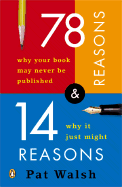 I admit it: When it comes to how-to-write books, I’m a junkie. I’ve read so many in the last 15+ years that it takes a rare gem to startle me out of my advice-induced stupor. Pat Walsh’s 78 Reasons Why Your Book May Never Be Published and 14 Reasons Why It Just Might is one such gem.
I admit it: When it comes to how-to-write books, I’m a junkie. I’ve read so many in the last 15+ years that it takes a rare gem to startle me out of my advice-induced stupor. Pat Walsh’s 78 Reasons Why Your Book May Never Be Published and 14 Reasons Why It Just Might is one such gem.Walsh is founding editor of MacAdam/Cage, an independent publishing house in San Francisco, and his book is a frank, funny look at the submission process from an editor’s point of view, focusing on ways aspiring authors shoot themselves in the foot when sending their writing out into the world. The book validates things I already knew (proofread your cover letter and don’t mention your pets), confirms a few things I suspected (yes, editors do save the worst submissions to giggle about with their colleagues), and explains some things I had only vague ideas about (what is a P&L statement, and why does it wield so much power?).
One quality, other than the biting humor, that sets this book apart is Walsh’s honesty. He repeatedly urges writers to be honest—in their writing, in their dealings with editors and agents, in evaluating their own work—and he leads the way by presenting his advice with unflinching candor. How refreshing to hear that, no matter how often editors at conferences protest to the contrary, editors do take agented submissions more seriously—and read them more quickly—than unagented submissions. How nice to finally know how editors feel about the slush pile—and why. How wonderful to find that most editors value honest, straightforward cover letters over the hopped-up hype many how-to books advise sending out.
I have only one quibble with this book. Walsh says recommendations from successful authors are one of the best ways to get editors and agents interested in reading your submission. I’m sure this is true, and if you know a successful author who loves your work, by all means, ask for a recommendation. But Walsh advises budding writers to go a step further, to send their manuscript to authors they don’t know, asking them to read it and send back a positive blurb. He says authors won’t mind, that in fact, they love finding new writers they can recommend to their own agents. Please don’t believe this. Published authors do not welcome unsolicited manuscripts any more than agents and editors do, and they have even less time and motivation to read them. Sending your story to a writer you don’t know is a colossal waste of time for both of you.
That said, the other ninety-one pieces of advice in this book are worth reading and acting on. They truly could make the difference between a book that may never be published and one that just might.
No comments:
Post a Comment